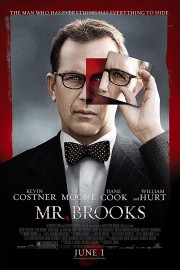Mr. Brooks
How is it we are so fortunate to have a movie which normally would seem more at home in the Fall- where it might be in better position to have an awards run- in the dead heat of the summer blockbuster derby. Of course, the best strategy is to open it opposite none of the epics in hopes of not being drown out. But that’s the setup about the film’s place in theatres- let’s talk about the film itself. There have been so many different takes on the serial killer genre over the years that it’s hard to imagine that anything could make the genre Hannibal Lecter and John Doe perfected in “Silence of the Lambs” and “Se7en,” respectively, feel fresh. That’s part of what makes “Mr. Brooks” so fascinating. For the first time, without any narrative trickery, I felt a film took you deep in the mind of a serial killer, and saw the moral abyss that necessitates such behavior, from their point-of-view. But the film wouldn’t be so fascinating if it was so clear-cut. Earl Brooks doesn’t want to kill anymore. He goes to AA meetings to attempt to fight his addiction, and for two years, he’s been able to keep those impulses at bay. But Marshall- who acts as Brooks’ “conscious,” if you will- soon succeeds in pushing him over to that darker part of himself, and- two years after his last murder (the police know him as The Thumbprint Killer)- he’s back to his old ways. But events transpire that might make this latest murder the one he gets caught for.
If it seems as though I’ve given away much of the plot, I assure you I have not. Few thrillers are as satisfyingly twisty or as psychologically thrilling as “Mr. Brooks,” where the less you know going in, the better for co-writers Bruce A. Evans (who also directs) and Raynold Gideon to work one over on you in the most entertaining of ways. Evans sometimes goes a bit overboard with the directing- making this moody thriller try to be more like “Se7en” (whether with flashy visuals or the hard-core techno on the soundtrack) when it works fine on its’ own terms- but he keeps things moving with the story, uncovering one turn after another in a way that ultimately holds up to close scrutiny (well, at least as close of scrutiny as you want to look with for such films).
With his performance two years ago in “The Upside of Anger” and his deviously charismatic performance here, Kevin Costner has finally returned as a full-fledged star. But as satisfying as his work in early favorites like “JFK,” “Bull Durham,” “A Perfect World,” “Tin Cup,” and the Oscar-winning “Dances With Wolves” was, something about his recent work in “Anger” and now “Brooks” feels, well, complete. In “Brooks,” he plays his first outright villain since, I believe, “A Perfect World” (one of Clint Eastwood’s gems as a director), except like that character, his Earl Brooks is a flawed protagonist, albeit more sociopathic than the earlier character, but no less likable (the easy charm evident in his best work is here too, but looser and more engaging). He treats his murderous tendencies as a disease that needs to be overcome, and it’s a secret he hides from his wife and daughter, not wanting to expose them to the embarassment that would come, and genuinely looking to put it behind him and live a normal life. But Marshall is always whispering in his ear, tempting him to give himself over to that impulse to kill. This is one of William Hurt’s most unsettling roles- infinitely more disturbing than his over-the-top work in “History of Violence”- and his outright wickedness makes it easy to see him as Earl’s antagonist in what is very much an internal battle for Brooks’ soul. This is the part that’ll likely shock audiences most about the film, but ultimately what they’ll find most riveting in the story.
That I’ve failed to yet mention Demi Moore as a cop on the Thumbprint Killer’s trail, Marg Helgenberger as Brooks’ wife, and Dane Cook as a witness to his latest murder with his own plans isn’t to diminish their contributions to the film; all three are fine, but ultimately footnotes in a darker, more diabolical story between two men with everything to lose if the other wins out. You’ll see what I mean when you see the film- who expected such a surprise from a summer loaded with fireworks but few matches to light them?










